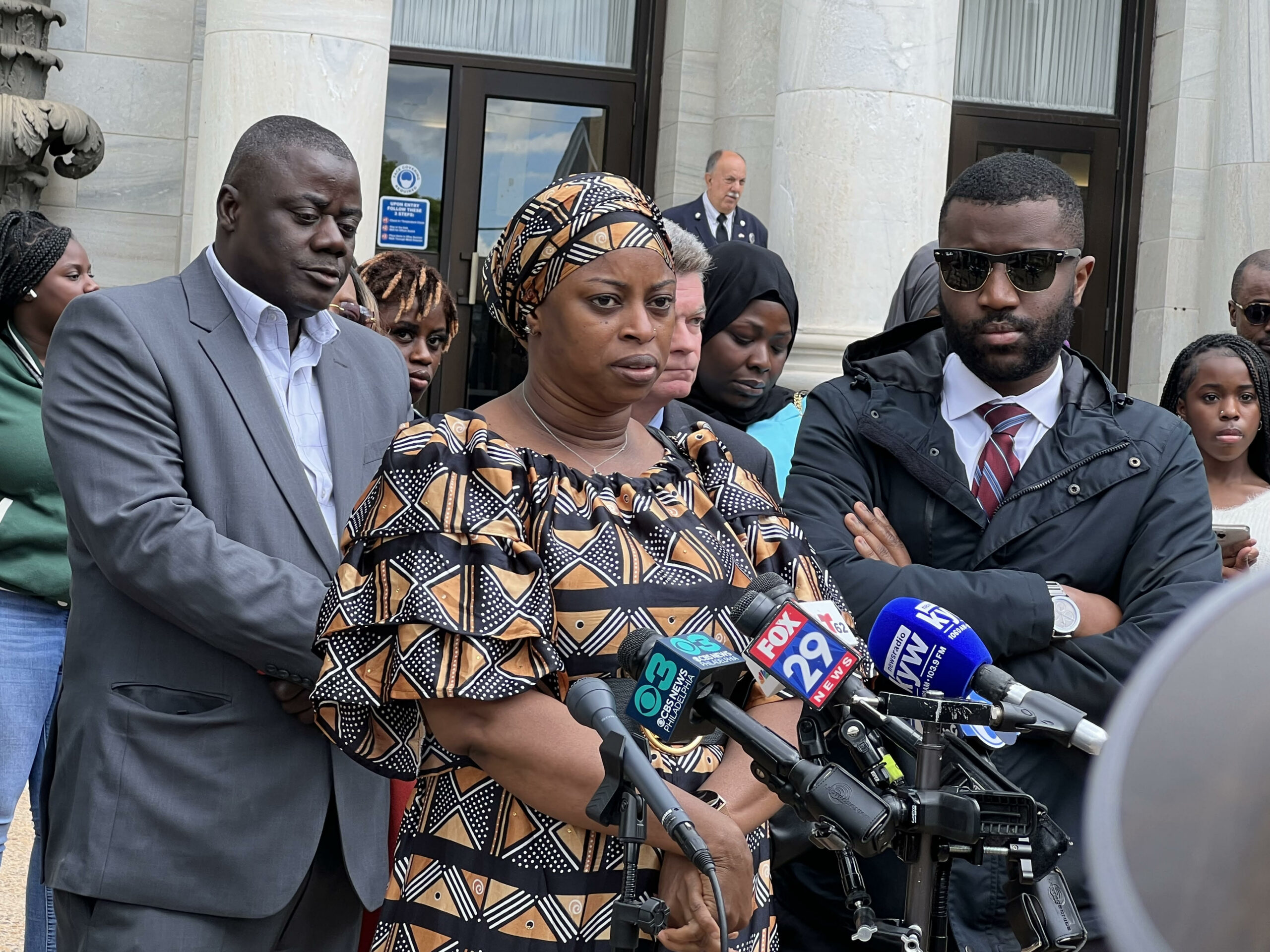Probation For Cops in Death of 8-Year-Old Sharon Hill Girl

“This isn’t about blue lives or Black lives. This is about Fanta’s life. And her life did, in fact, matter.”
At the sentencing Friday, Judge Margaret Amoroso repeated those words by one of 8-year-old Fanta Bility’s relatives and three former Sharon Hill police officers. One of them fired the bullets that struck and killed the girl as she left a football game with her family on August 27, 2021.
There was standing room only in the courtroom with supporters of both the Bility family and the three former officers. Law enforcement officers stood along the courtroom walls.
The former officers had pleaded guilty to 10 counts of reckless endangerment. Amoroso sentenced them to five years probation, including 11 months of house arrest, wearing a monitor to start.
The officers—Devon Smith, Brian Devaney, and Sean Dolan—apologized profusely and offered their condolences to the Fanta Bility family.

Fanta Bility (CREDIT: Facebook)
Devaney could barely speak as he tearfully told the family, “No words can express how sorry I am for the loss of your baby girl, Fanta.”
Devaney, 43, was a police resource officer at Academy High School. He asked to work that night because he missed the kids while the school was closed because of COVID.
Smith said he had met Fanta at a playground while on patrol and several times after that.
“I am a father of three. I can’t imagine the pain and agony you feel every day,” said Smith.
Dolan had been a rookie and on the police force only 10 days before the shooting.
The incident began when a 16-year-old Sharon Hill boy and Hasein Strand, 18, of Collingdale, began shooting at each other near the Academy Park High School football field. With bullets flying, the officers mistakenly believed that shots had come from an oncoming car. The officers returned fire, and bullets flew into a crowd leaving the football game, striking four people, including Fanta, and grazing her sister.
Deputy District Attorney Doug Rhoads spoke on behalf of the Bility family about the “tragic unintended consequences” that took their daughter’s life. “A beautiful, young little girl full of life.” He said the family is still grieving, struggling with anger, sadness, and loss.
“Fanta’s brothers and sisters, all around them, are memories and the ghost of Fanta,” he said. “They have survivor’s guilt. Why did this happen? They wouldn’t have been there if I hadn’t been cheerleading that night.”
He told the siblings, “This wasn’t your fault. You didn’t cause this.”
“Everyone talks about accountability,” Rhoads said. “That is part of the justice process.”
Her father, Morris Bility, said Fanta was “sweet and kind.” She liked to ride her bike and go to the playground.
One of Fanta’s uncles died from gun violence in Philadelphia after Fanta’s death, causing Fanta’s grandmother to return to Liberia, where the family had fled to escape war and violence.
“They came here seeking safety, the American dream,” said Rhoads.
He said that Fanta’s mother, Tenneh Kromah, has been stoic and strong for her other children.
The family believes in forgiveness and has forgiven the officers.
“They want Fanta’s life and death to mean something,” said Rhoads. Fanta’s mother “has forgiveness in her heart for these three defendants. She, of course, will never forget.”
She held Fanta in her arms after the girl was wounded and yelled for help, he said.
Rhoads asked the judge to impose jail sentences on the former officers.
In handing down the sentences, Amoroso said she knew some people would think they were too lenient and some would think they were too harsh. She noted that the former officers did not have prior criminal records and posed no danger to society.
“This case is a tragedy,” she said. “If what I did today could give you back your child, I would do so.”
Outside the courthouse afterward, Abu Bility said, “We are very disappointed by this sentence by the judge .., nevertheless, we take some comfort in knowing the former officers are taking accountability for their actions. And our purpose now is to move forward so we can ensure this never happens to another child and family again.”
The incident should “serve as a wakeup call to local and state governments that municipal police need better training,” he said.
Morris Bility said the family appreciates people who have been supporting them. Pennsylvania and the United States of America need to train police better, he said.
Tenneh said, “I just wanted to say thank you to everyone who supports us.”
An older sister, Mawatta Bility, also spoke.
Fanta is “forever in our hearts. And she will be forever by our side … And I’d like to say we forgive the officers on behalf of our family,” she said.
District Attorney Jack Stollsteimer said he was “honored and blessed” to get to know the Bility family.
“The people you see behind me are some of the best people I’ve met in my entire life,” he said. “Their faith has gotten them here today. Their forgiveness to the officers who took their daughter’s life. And all of you heard those officers who took responsibility for what they did, step up and offer their sincere and heartfelt apology for the tragic events of the night. And that’s what this was, a tragedy.”
Asked by a reporter if he was upset that the judge did not sentence the officers to prison, Stollsteimer said, “The judge is the one who gets to make this decision …It is not my duty or my right to question that at this point. She has made her determination.”
Lawyer Bruce L. Castor Jr., who represents the family in a civil case, called them “a remarkable family.” He said the Delaware County DA’s office was very professional. “This was a very difficult case to sort out. These people never stopped. They went down the wrong lane. They backed up and went down the right lane. They really had their hearts in the right place.”
“In Delaware County, they do it right,” said Castor, the former Montgomery County DA. “I think we can say we are satisfied with the sentence…What everybody seems to understand is police officers need better training and better supervision. In the coming days and few weeks, we will be addressing that problem in the civil courts.”




